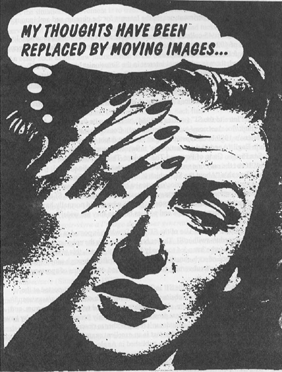
"In all that has happened in the last twenty years, the most important change lies in the very continuity of the spectacle. Quite simply, the spectacle"s domination has succeeded in raising a whole generation molded to its laws. The extraordinary new conditions in which this entire generation has lived constitute a comprehensive summary of all that, henceforth, the spectacle will forbid; and also all that it will permit." Guy Debord (1988).
 |
| Conformity? Ignorance? Apathy? Prejudice? |
Debord describes the spectacle and its impact that the history of social life can be understood as "the decline of being into having, and having into merely appearing." It is within this idea "historical moments at which the commodity completes its colonization of social life." With the term spectacle, the system can easily be seen as a system that is in high power due to the few corporate companies that control the mass media, advanced capitalism, and the government who allows this cultural phenomena to continue "the spectacle, taken in the limited sense of 'mass media' which are its most glaring superficial manifestation".

In Chapter 2 of Society of the Spectacle, the reader is able to connect with a theme that has been around for several of years, just to say the least. Debord writes: “Commodity is described as a product, and just as other product, it holds an economic value. At the moment of economic abundance, the concentrated result of social labor becomes visible and subjugates all reality to appearance, which is now its product” (Society as the Spectacle, Thesis 50).
According to Debord, "The Spectacle is not a collection of images; rather, it is a social relationship between people that is mediated by images". This idea of spectacle is given form by Disney characters such as Snow White, Jasmine, Sleeping Beauty, Cinderella, and many more. Debord explains that through the spectacle society lives vicariously through fictional characters, celebrities, and commodities. Because society is demanding what the corporations are supplying, consumers eat up mass media as if it was The Last Supper. Young girls are taught from an early age from the wonderful corporation of Disney what they should look like, how they should act, and what they should ultimately grow up to be. If Disney movies does not due the trick, society has created a life model of what a women should like, Barbie. Whether it is Disney or Barbie Debord`s theory connects how few corporate companies that control the mass media combined with advanced capitalism, and the government allow this cultural phenomena to continue Please watch the following video to further understand the connection between Debord`s theory of the spectacle and its connection with one of the top corporate companies in the world and its effect on young girls...
Debord defines the spectacle not as the images
of cultural production, but as the social relations mediated through
those images (Debord, Thesis 4). The
spectacle’s pseudo-world exists only in viewing this world but only experienced through a screen. The experience of living amongst the spectacle creates a
fragmented existence for the competing
ideologies, lifestyles, and aesthetics that perhaps other media is trying to break through to consumers. Furthermore, unless it has the face of a famous celebrity society is not interested. Debord’s explanation of celebrity posits that celebrities are
spectacles as living people are a total embodiment a spectacular lifestyle (Debord, Thesis 60). Therefore, the celebrity is the consumers living pseudo-world spectacle.
 |
| Britney Spears |
hi
ReplyDelete